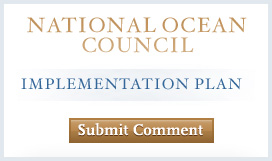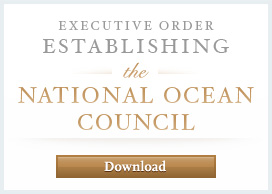Priority Objectives
Implementation Strategy
The implementation strategy identifies priority objectives that our Nation will pursue to address some of the most pressing challenges facing the ocean, our coasts, and the Great Lakes.
Nine National Priority Objectives
- Ecosystem-Based Management: Adopt ecosystem-based management as a foundational principle for comprehensive management of the ocean, our coasts, and the Great Lakes.
- Coastal and Marine Spatial Planning: Implement comprehensive, integrated, ecosystem based coastal and marine spatial planning and management in the United States.
- Inform Decisions and Improve Understanding: Increase knowledge to continually inform and improve management and policy decisions and the capacity to respond to change and challenges. Better educate the public through formal and informal programs about the ocean, our coasts, and the Great Lakes.
- Coordinate and Support: Better coordinate and support Federal, State, tribal, local, and regional management of the ocean, our coasts, and the Great Lakes. Improve coordination and integration across the Federal Government and, as appropriate, engage with the international community.
- Resiliency and Adaptation to Climate Change and Ocean Acidification: Strengthen resiliency of coastal communities and marine and Great Lakes environments and their abilities to adapt to climate change impacts and ocean acidification.
- Regional Ecosystem Protection and Restoration: Establish and implement an integrated ecosystem protection and restoration strategy that is science-based and aligns conservation and restoration goals at the Federal, state, tribal, local and regional levels.
- Water Quality and Sustainable Practices on Land: Enhance water quality in the ocean, along our coasts, and in the Great Lakes by promoting and implementing sustainable practices on land.
- Changing Conditions in the Arctic: Address environmental stewardship needs in the Arctic Ocean and adjacent coastal areas in the face of climate-induced and other environmental changes.
- Ocean, Coastal, and Great Lakes Observations, Mapping, and Infrastructure: Strengthen and integrate Federal and non-Federal ocean observing systems, sensors, data collection platforms, data management, and mapping capabilities into a national system, and integrate that system into international observation efforts.










